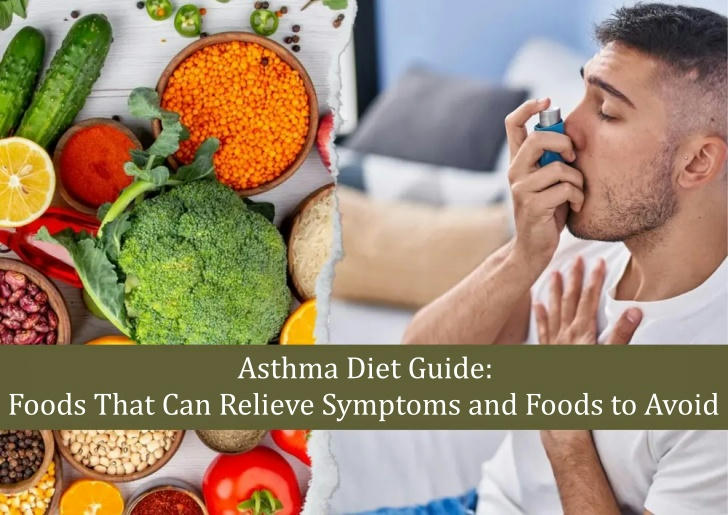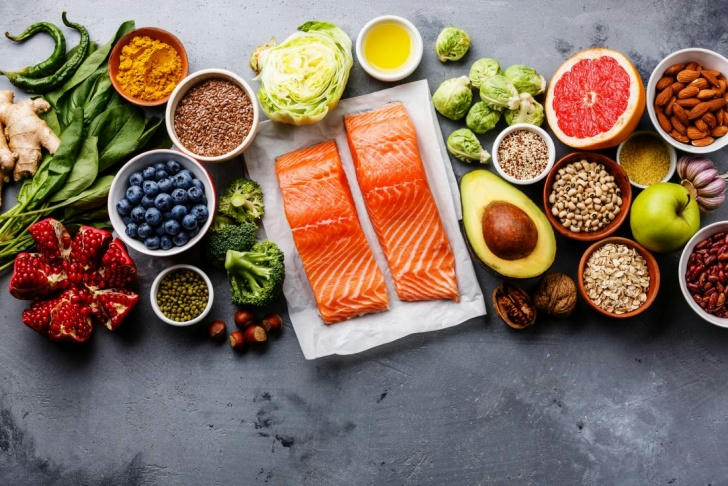Asthma Diet Guide: Foods That Can Relieve Symptoms and Foods to Avoid
Asthma is a common chronic respiratory disease characterized by inflammation and narrowing of the airways, which leads to symptoms such as difficulty breathing, wheezing, and coughing. Although asthma cannot be cured through diet, a scientific and balanced diet can help alleviate symptoms, reduce the frequency of attacks, and improve overall health. Understanding which foods benefit asthma patients and which may worsen symptoms is an important part of managing asthma.

Foods That Are Beneficial for Asthma Patients
Foods Rich in Antioxidants
Antioxidants help reduce inflammation and protect the airways from damage. Asthma patients can increase their intake of the following foods:
• Fruits and Vegetables: Foods rich in vitamins C, E, and beta-carotene, such as oranges, strawberries, blueberries, carrots, spinach, and broccoli, can effectively fight free radicals and reduce oxidative stress in the airways.
• Dark Green Vegetables: Kale, spinach, and cabbage are rich in vitamins A and C, which help strengthen the immune system and reduce inflammation.
Foods Rich in Omega-3 Fatty Acids
Omega-3 fatty acids have anti-inflammatory effects and help reduce airway inflammation. Asthma patients can increase their intake of omega-3 fatty acids by consuming the following foods:
• Fatty Fish: Such as salmon, sardines, and tuna.
• Flaxseeds and Chia Seeds: These plant-based foods also contain rich amounts of omega-3 fatty acids.
• Walnuts and Flaxseed Oil: These foods can serve as alternatives for omega-3-rich options.
Foods Rich in Magnesium
Magnesium is an essential mineral for maintaining lung health. Studies have shown that magnesium helps relax the smooth muscles of the airways, reducing asthma symptoms. Foods that are good sources of magnesium include:
• Nuts and Seeds: Such as almonds, Brazil nuts, and pumpkin seeds.
• Whole Grains: Such as oats, brown rice, and whole-wheat bread.
• Legumes: Such as black beans, lentils, and chickpeas.
Foods Rich in Vitamin D
Vitamin D helps strengthen the immune system and regulate immune responses in the airways. Many asthma patients, especially those in regions with less sunlight, have lower levels of vitamin D. Foods rich in vitamin D include:
• Fortified Foods: Such as vitamin D-fortified milk and plant-based milk (e.g., soy milk, almond milk).
• Fish: Such as salmon, cod, and mackerel.
• Egg Yolks and Beef Liver: These foods also contain some vitamin D.
Foods Rich in Fiber
A high-fiber diet helps maintain gut health and immune function. Numerous studies suggest that a healthy gut microbiome has a positive effect on reducing allergic diseases, such as asthma. Foods rich in fiber include:
• Whole Grains: Such as brown rice, whole wheat bread, and oats.
• Legumes and Vegetables: Such as peas, lentils, cauliflower, and tomatoes.

Foods Asthma Patients Should Avoid
Foods That Trigger Allergic Reactions
Some foods may trigger allergic reactions and worsen asthma symptoms. Common allergenic foods include:
• Nuts and Peanuts: These foods are common allergens and may cause difficulty breathing and wheezing.
• Shellfish and Seafood: Such as shrimp, crab, and shellfish.
• Dairy Products: Some asthma patients are sensitive to proteins in dairy, which may cause allergic reactions and airway inflammation.
High-Salt Foods
A high-salt diet can lead to water retention and airway inflammation, exacerbating asthma symptoms. Asthma patients should avoid or reduce their intake of the following foods:
• Processed Foods: Such as instant noodles, canned foods, and pickled foods.
• Fast Food and Takeaway: Many fast foods are high in salt, so they should be eaten sparingly.
Foods Containing Preservatives and Artificial Additives
Some processed foods contain preservatives, artificial colors, and flavorings that may trigger allergic reactions or worsen asthma symptoms. Common foods containing such additives include:
• Carbonated Drinks: Especially those with artificial colors and flavorings.
• Processed Snacks: Such as chips, cookies, and candies.
• Pickled Foods: Such as pickled meats and vegetables.
High-Sugar Foods
A high-sugar diet can lead to weight gain and obesity, which may worsen asthma symptoms. Additionally, excessive sugar can affect the immune system, leading to airway inflammation. Asthma patients should try to avoid:
• Sugary Beverages: Such as soda and fruit juices.
• High-Sugar Snacks: Such as candies, cakes, and desserts.
Tobacco and Alcohol
Smoking and alcohol consumption can exacerbate asthma symptoms by causing airway constriction and inflammation. Asthma patients should avoid tobacco smoke and limit alcohol intake.

Conclusion
Although food cannot directly cure asthma, a scientifically balanced diet can help manage asthma symptoms and reduce the frequency of attacks. Asthma patients should choose foods rich in antioxidants, omega-3 fatty acids, magnesium, and vitamin D to boost immunity and reduce inflammation. At the same time, it is important to avoid foods that may trigger allergic reactions, and reduce the intake of high-salt, high-sugar, and processed foods. Working with a doctor or nutritionist to create a personalized dietary plan based on individual conditions will help control asthma more effectively and improve quality of life.
